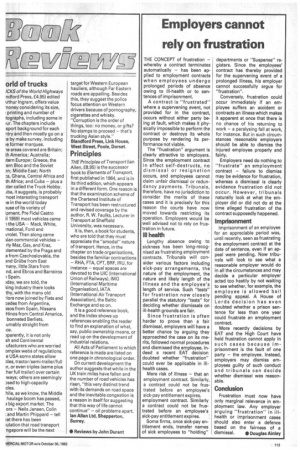Employers cannot rely on frustration
Page 69

If you've noticed an error in this article please click here to report it so we can fix it.
THE CONCEPT of frustration — whereby a contract terminates automatically — has been applied to employment contracts when employees undergo prolonged periods of absence owing to ill-health or to sentences of imprisonment.
A contract is "frustrated" where a supervening event, not provided for in the contract, occurs without either party being at fault, which makes it physically impossible to perform the contract or destroys its whole purpose by rendering its performance not viable.
The "frustration" argument is clearly attractive to employers. Since the employment contract in effect self-destructs, no dismissal or resignation occurs, and employees cannot claim unfair dismissal or redundancy payments. Tribunals, therefore, have no jurisdiction to consider the merits of these cases and it is precisely for this reason the courts have now moved towards restricting its operation. Employers would be well advised not to rely on frustration in future.
HI health
Lengthy absence owing to sickness has been long-recognised as frustrating employment contracts. Tribunals will consider various factors including sick-pay arrangements, the nature of the employment, the nature and likely length of the illness and the employee's length of service. Such "tests" for frustration now closely parallel the statutory "tests" for deciding whether dismissals on ill-health grounds are fair.
Since frustration is often harder to prove than a fair dismissal, employers will have a better chance by arguing they approached the case on its merits, followed normal procedures and dismissed the employee. Indeed a recent EAT decision doubted whether "frustration" could ever be applicable in illhealth cases.
Mere risk of illness — that an employment contract. Similarly, a contract could not be frustrated before an employee's sick-pay entitlement expires.
employment contract. Similarly a contract could not be frustrated before an employee's sick-pay entitlement expires.
Some firms, once sick-pay entitlement ends, transfer names of sick employees to "holding" departments or "Suspense" registers. Since the employees' contract has thereby provided for the supervening event of a prolonged illness, his employer cannot successfully argue for "frustration".
Conversely, frustration could occur immediately if an employee suffers an accident or contracts an illness which makes it apparent at once that there is no chance of his returning to work — a paralysing fall at work, for instance. But in such circumstances reasonable employers should be able to dismiss the injured employee properly and fairly.
Employers need do nothing to "frustrate" an employment contract — failure to dismiss may be evidence for frustration, whereas a dismissal is clearly evidence frustration did not occur. However, tribunals naturally look at what the employer did or did not do at the time alleged frustration of the contract supposedly happened.
Imprisonment
Imprisonment of an employee for an appreciable period was, until recently, seen as frustrating the employment contract at the date of sentence, even if an appeal were pending. Now tribunals will look to see what a reasonable employer would do in all the circumstances and may decide a particular employer acted too hastily by not waiting to see whether, for example, the employee is allowed bail pending appeal. A House of Lords decision has even doubted whether a prison sentence for less than one year could frustrate an employment contract.
More recently decisions by EAT and the High Court have held frustration cannot apply in such cases because imprisonment is the fault of one party — the employee. Instead, employers may dismiss employees guilty of such conduct and tribunals can decide whether dismissal was reasonable.
Conclusion
Frustration must now have only marginal relevance in employment law. Any employer arguing "frustration" in illhealth or imprisonment cases should also enter a defence based on the fairness of a dismissal. • Douglas Ainley






































































